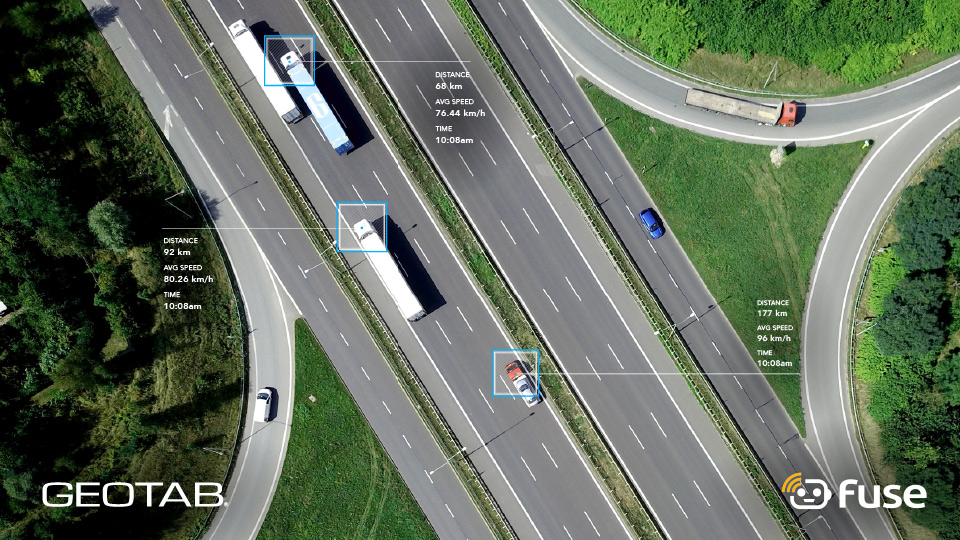Driver safety: How fleet managers can put the brakes on speeders
Stopping speeders requires action.

There’s no denying that employers have an important role — and responsibility — in helping reduce the number of deaths and injuries related to vehicle collisions. Stopping fleet speeding requires action. Employers can positively influence employee safety on and off the job through safety-focused leadership.
Despite common belief, speeding doesn’t save time and is actually not a more efficient way to get from one place to another.
For example, on a trip in the city, any time saved can be easily added back if you run into traffic or get a string of red lights. So, allowing employees to speed is a false economy — any time saved is marginal as compared to the increased risks and indirect collision costs. Additionally, speeding is illegal and the related fines are highly expensive for drivers and their companies.
For everyone’s safety, there is no need to speed. Getting to your destination without breaking the law or being involved in a crash is the best goal.
Companies truly need to take a stand on whether or not speeding is worth the increased risk of crash and the related potential for bodily injury and legal cost. Launching a company-wide safe driving campaign for employees is highly recommended.
What is speeding?
Simply put, speeding is when any motorised vehicle travels at a rate of speed that is faster than the posted limit for a given area or set of conditions. Speed limits are put in place to protect all road users, including drivers and pedestrians. This is why you may see different speed limits posted in different locations — like school or construction zones — or residential versus non-residential areas. Factors such as road conditions can also reduce the maximum speed that vehicles are allowed to travel — like sharp bends or graded roads.
What are the disadvantages of speeding?
The higher the speed, the greater the consequences. For example, in a head-on collision between vehicles, there is a 95% chance that a driver will survive at 60 km, but only a 20% chance of survival at 90 km/h?
Before you — or your drivers — get behind the wheel, you need to understand the expenses associated with speeding and aggressive driving, including:
- Fines
- Demerit points
- License suspension
- Collisions, which may result in vehicle damage, or injury or death
- Higher rates of fuel consumption
How can fleets stop speeding?
Launching a workplace safety campaign can help companies reduce speeding and aggressive driving in their fleets. Telematics is a great addition to any fleet safety program by providing objective insights on performance for coaching drivers. A telematics platform like Geotab makes it possible to take a baseline on speeding activities, set rules, and then track progress towards goals.
For example, fleets can track vehicle speed (among many other things) with the Geotab GO device. Speed information can be viewed in MyGeotab, right from the map.

What is a driver safety program?
Employers can find opportunities to save significantly on fuel, collision costs and even lives by introducing a driver safety program in their company. Driver safety programs can support a company’s overall fleet safety program and enhance driver safety and productivity. Incorporating a speed reduction campaign is an effective method for focusing on a specific component of the driver safety program.
With many companies, fleet costs take up a large portion of the total operating budget. A driver safety program presents a new avenue for cost savings, and is a win-win for everyone.
Using telematics for fleet safety
With a telematics-based speeding report, fleet managers can see who has been speeding and how often. For example, the Top 5 Speeding Violations report in MyGeotab displays the top 5 drivers with the highest number of speeding events by day, week or month. Whether the fleet manager has received complaints about speeding drivers or simply wants to improve overall fleet safety, this report can help identify which drivers in the fleet have the most dangerous driving habits.
Managers can also use telematics software to reinforce driving policy by setting up an exception in MyGeotab for speeding or creating a rule around speeding against a posted speed limit (where available). For more information on managing speeding and aggressive driving, read this article on driver scorecards.
What are the benefits of launching a speed reduction campaign
There are many benefits to implementing a speed reduction campaign in your fleet, including:
- Lower penalties and fines
- Reduced equipment losses
- Less wear and tear on engines, brakes, and tires
- Reduced loss in fuel
- Lower stress levels for both the drivers and their companies
- Reducing speed can also add up to significant cost savings for employers. This money can be redirected to other areas of the business or straight to the bottom line.
How to launch a successful speed reduction campaign
- Set a goal. In this case, the goal would be to reduce, or eliminate driver speeding violations (as defined in your Driver Safety Policy
- Identify a campaign manager and internal sponsor
- Create your campaign. Include a communication and compliance strategy
- Promote your campaign
- Evaluate
Assemble a team of people who will champion the initiative. Be sure to include employees on the campaign committee. Share safety best practices, plan activities and communications to promote the campaign. Posters with facts and visuals can be very effective. Communicate regularly throughout the campaign to keep interest and enthusiasm going.
Conclusion
Speeding is one of the most prevalent factors contributing to crashes and traffic related deaths. In addition, speeding increases fuel expense. Therefore, targeting driver speeding is a truly worthwhile effort for employers.
Implementing a “No Need to Speed!” initiative can potentially save a company thousands of dollars, in a conservative estimate. Protecting employees from motor vehicle crash injury is a profitable investment of time and resources. Importantly, it helps companies underscore that they truly care about the well-being of each employee.
It only takes a second for your life to change — and someone wants you home tonight, so why wouldn’t you choose safety?
You can use Geotab to manage driver speeding, plus much more. To learn more, explore our fleet safety solutions.
If you have questions or want to hear what others are saying about fleet safety,
Originally published February 7, 2017. Updated October 24, 2019.
The Geotab Team write about company news.
Related posts



.png)
Reduce risky driving behaviours with video telematics technology
November 6, 2023
3 minute read
.jpg)

Understanding acceleration, braking and cornering in MyGeotab
September 16, 2021
2 minute read
